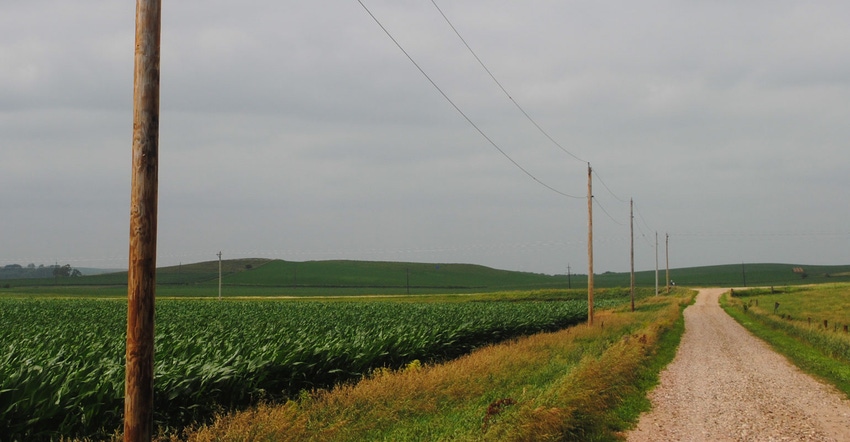
A few power lines are contacted with farm equipment across Nebraska each season. But this year is different. The number of power line contacts by large agricultural implements, especially sprayers, has dramatically increased, starting in early May.
“Nebraska Public Power District cares about agriculture,” says Scott Walz, NPPD transmission and distribution manager. “Farming is the No. 1 industry in the state. Just as we want our NPPD employees to go home safely at the end of each workday, we also want farmers and ranchers to go home safely to their families at the end of the day.”
NPPD has seen more power line contacts this year than any other year in recent memory, Walz explains. “The number of big sprayers being used on the farms and in the fields has picked up in the last five years," he notes. "We used to see aircraft sprayer contacts, but we have very few of those now. Now, it is more boom contact from the big sprayers.” But Walz adds that contacts with lines this year have resulted from all kinds of farm equipment.
“We ask producers or implement operators to take care when they pull into new fields,” he says. “When they pull into a field, before they unrack the booms, they should step out of the cab and look around. If they see a pole, that is a good indication of power lines overhead and close by. Be aware of those lines and pull ahead into the field and completely clear of the poles.”
Walz encourages farm equipment operators, especially sprayer operators, to get into the habit of pulling farther into the field when they change fields, and to get out of the cab each time to look for power lines overhead and power poles nearby.
There needs to be at least 20 feet of clearance between the booms and the power lines, he adds. It also is best if a spotter is available to be in the field at the time when the booms are unracked to help the operator avoid power line contact.
“You don’t even need to touch the power lines with the equipment,” Walz explains. “With high-voltage systems, electricity can jump to the boom if the conditions are right.”
Often, operators are spraying fields early in the morning when there is high humidity and less wind. These weather conditions are perfect for spraying, but they also could allow electricity to make the jump from the lines to the equipment, if the equipment comes into close enough proximity.
If a contact occurs, be sure to stay inside the machine if that is possible and remain calm. “Do not move the machine. Call 911,” Walz advises. “You could make matters much worse by moving the equipment.” If there is a chance that a fire could break out and the operator must leave the machine, operators need to be aware of the proper procedure.
Electricity will be in the soil around the machine, if the machine is contacted with the lines. “The only reason to leave the machine in the case of a contact is if the machine is in danger of burning,” Walz says. “If that is the case, lower yourself to the lowest step of the ladder on the machine. With the door open, stand up, tuck your elbows into your stomach and hold your hands close to your chest. Jump with your feet together out and as far away from the machine as you possibly can. Then shuffle your feet away from the machine.” Following this procedure could keep the operator alive.
There are all kinds of scenarios that can occur because of power line contacts. “The least would be that you mess up the electrical board and system of your machine,” Walz says. “The worst would be a fatality.”
With that in mind, being safe around power lines is crucial. Walz says the easiest way to avoid bad outcomes around lines is to simply pull ahead in the field, and get out of the cab when changing fields and check for adjacent power lines before unracking the booms of the equipment.
Having a spotter in the field may not always be feasible, but getting out of the cab and checking for lines can be a simple method to preventing line contacts and saving lives.
Learn more about safety around power lines by visiting nppd.com.
About the Author(s)
You May Also Like






